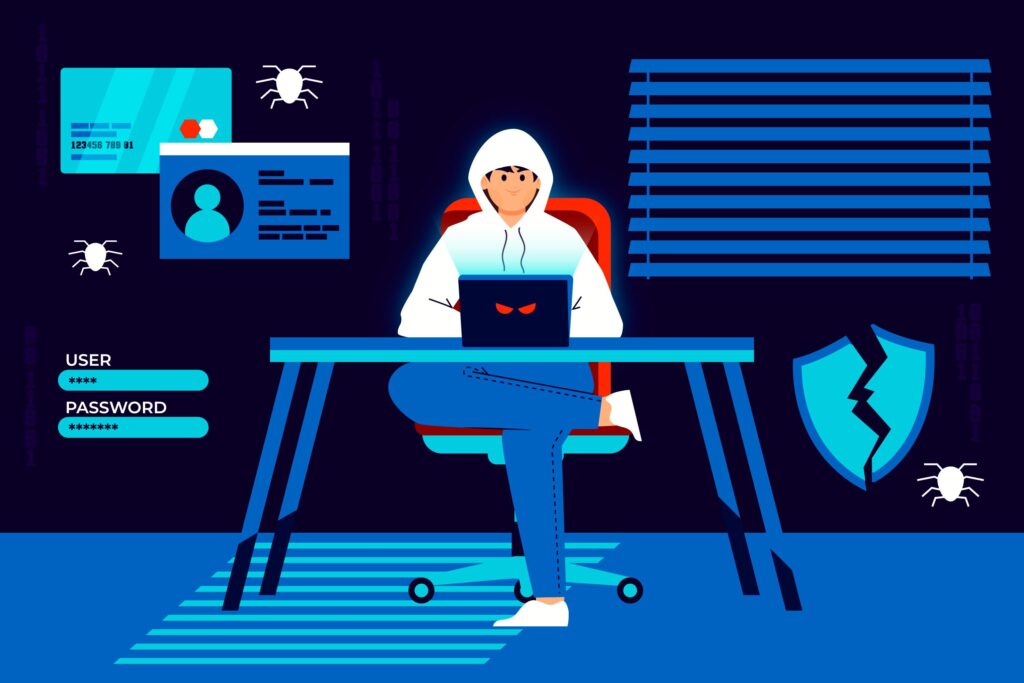The term “hacker” often conjures up images of shadowy figures in dark rooms, fingers flying over keyboards as they infiltrate computer systems, steal sensitive information, and wreak havoc. While some hackers do engage in malicious activities, it’s essential to recognize that not all hackers are inherently bad. In this article, we will delve into the complex world of hacking, explore the different types of hackers, and challenge the stereotypes that surround this multifaceted subculture.

Defining Hacking:
At its core, hacking is the act of exploring the limits of a system, software, or network to understand how it works and identify potential vulnerabilities. Hacking can involve various activities, including programming, tinkering with hardware, and delving into the intricacies of software.
The Three Main Categories of Hackers:
Hackers can be broadly categorized into three groups, each with distinct motivations and ethical standards:
-
White Hat Hackers (Ethical Hackers): White hat hackers are the “good guys” of the hacking world. They use their skills to identify and fix security vulnerabilities, protect systems, and assist organizations in strengthening their cybersecurity defenses. Ethical hackers often work as security professionals, consultants, or researchers. They perform authorized hacking, commonly known as penetration testing or vulnerability assessment, to enhance security.
-
Black Hat Hackers: Black hat hackers are the stereotypical “bad guys.” They engage in hacking for malicious purposes, including stealing sensitive information, launching cyberattacks, or committing cybercrimes like identity theft and fraud. Their actions are illegal and can result in severe legal consequences if caught.
-
Gray Hat Hackers: Gray hat hackers fall somewhere between white hat and black hat hackers. They may identify and disclose vulnerabilities in systems without authorization, sometimes seeking a reward or recognition for their efforts. While their intentions may not be malicious, their actions can still raise ethical and legal questions.
Motivations Behind Hacking:
Hackers are motivated by a range of factors, including:
-
Curiosity and Exploration: Many hackers are driven by curiosity and a desire to understand how things work. They explore systems to gain knowledge and skills.
-
Security Enhancement: White hat hackers are motivated by the desire to make systems more secure by identifying and fixing vulnerabilities.
-
Financial Gain: Black hat hackers often seek financial gain, whether through cybercrime, ransomware attacks, or selling stolen data on the dark web.
-
Activism and Ideology: Some hackers are motivated by political or ideological beliefs and engage in hacktivism to promote their causes.
-
Challenge and Recognition: Hacking can be a challenging intellectual pursuit, and hackers may seek recognition or notoriety within the hacking community.
The Role of Hackers in Cybersecurity:
Ethical hackers, or white hat hackers, play a crucial role in cybersecurity. Their skills and knowledge are invaluable in identifying and addressing security vulnerabilities before malicious actors can exploit them. Organizations often employ ethical hackers to conduct penetration testing and security assessments to proactively enhance their defenses.
By identifying and responsibly disclosing vulnerabilities, ethical hackers contribute to a safer digital landscape, protecting sensitive data and preventing cyberattacks. They are instrumental in helping organizations stay one step ahead of cyber threats.
Ethical Hacking and Certification:
The field of ethical hacking has become so prominent that it has given rise to certifications such as Certified Ethical Hacker (CEH) and Certified Information Systems Security Professional (CISSP). These certifications validate the skills and knowledge of ethical hackers and are recognized by organizations worldwide. Ethical hackers who hold these certifications are often sought after by companies looking to bolster their cybersecurity measures.
Conclusion:
In the complex world of hacking, it’s important to dispel the misconception that all hackers are inherently bad. While malicious hackers (black hat hackers) do exist and pose significant cybersecurity threats, ethical hackers (white hat hackers) actively work to protect systems and networks. They use their skills to find vulnerabilities, improve security, and contribute to the ongoing battle against cyber threats.
The hacking community is multifaceted, encompassing individuals with diverse motivations and ethical standards. Recognizing the positive role of ethical hackers in cybersecurity is essential for understanding that not all hackers are villains. In a digital age where cyber threats are constantly evolving, ethical hackers serve as invaluable allies in the ongoing effort to secure our interconnected world.